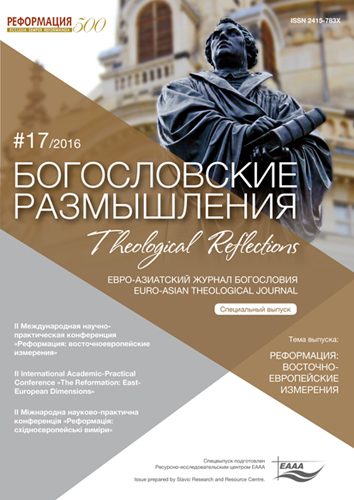Лев Толстой и протестантизм
Keywords:
Л. Н. Толстой, протестантизм, редстокизм, пашковство, искупление верой, евангельская проповедь, индивидуализация религиозности.Abstract
Статья посвящена рассмотрению отношения к протестантизму Льва Николаевича Толстого через анализ его художественных и религиозно-философских произведений, а также через некоторые факты его биографии. Автор анализирует изображение в романе «Анна Каренина» евангелического движения, связанного с проповедью лорда Г. Редстока, то влияние, которое идеи этого движения оказывают на убеждения и поступки героев романа, и отмечает отрицательное отношение Толстого к учению об искуплении верой. Затем рассматривается использование Толстым некоторых результатов критических исследований новозаветных текстов, прежде всего, принадлежавших авторам Тюбингенской школы. Исследуется отношение к протестантизму, выраженное в основных религиозно-философских трудах Толстого («Исповедь», «Исследование догматического богословия», «В чем моя вера?», «Соединение и перевод четырех Евангелий»). Автор выделяет следующие основные темы, о которых высказывался Толстой: это проблема религиозной истины, сущность церкви, соотношение церкви и государства, смысл проповеди Евангелия. Отмечено близкое знакомство Толстого с некоторыми представителями редстокизма и пашковства через его сотрудничество с В. Г. Чертковым. Далее автор обращается к изображению евангельского движения в романе «Воскресение» и подчеркивает, с одной стороны, ироническое отношение Толстого к его проповеди, и, с другой стороны, уважительное отношение к тюремному служению. Автор делает вывод о том, что степень критичности в описании Толстым евангелического движения была прямо пропорциональна соотношению в нем веры и дел, как он это понимал. В заключении автор подчеркивает важность для Толстого личной внутренней свободы в выборе своих убеждений, а также его близость современной ситуации индивидуализации религиозности.
Ключевые слова: Л. Н. Толстой, протестантизм, редстокизм, пашковство, искупление верой, евангельская проповедь, индивидуализация религиозности.
Abstract: The article “Leo Tolstoy and Protestantism” considers the perception of Protestantism by Leo Tolstoy through analysis of his artistic and religious-philosophical works, as well as through some facts of his biography. The author examines the image of the evangelical movement in the novel “Anna Karenina” associated with the mission of lord Granville Radstock, the impact of the ideas of this movement over the beliefs and actions of the characters of the novel, and underlines the negative attitude of Tolstoy towards the doctrine of redemption by faith. Next, the author considers how Tolstoy uses some results of the critical studies of the New Testament, particularly, the ones belong to the representatives of the Tübingen School. The attitude towards Protestantism as it is expressed in Tolstoy’s religious-philosophical works (“Confession”, “Critique of Dogmatic Theology”, “What I Believe”, “The Four Gospels Harmonized and Translated”) is analyzed. The author identifies key themes of Tolstoy’s critique: problem of religious truth, the essence of the Church, the relationship between church and state, the meaning of the Gospel. Tolstoy’s close relationship with some representatives of Redstokism and Pashkovshchina through his cooperation with Vladimir Chertkov is noted. Finally, the author refers to the image of the evangelical movement in the novel "Resurrection" and emphasizes Tolstoy’s ironic attitude towards its preachers, on one hand, and respect for prison ministry, on the other hand. The author concludes that the degree of severity in Tolstoy’s description of the evangelical movement is proportional to the balance of faith and works, as he understood it. In conclusion, the author emphasizes the importance of personal inner freedom for Tolstoy in his beliefs, as well as his compliance with the current situation of the religious individualization.
Keywords: Leo Tolstoy, Protestantism, Redstokism, Pashkovshchina, redemption by faith, preaching the Gospel, individualization of religiosity.
Downloads
How to Cite
Issue
Section
License
Copyright (c) 2020 Елена СТЕПАНОВА

This work is licensed under a Creative Commons Attribution-NonCommercial 4.0 International License.
All articles published in the Journal are distributed under a Creative Commons Attribution-NonCommercial 4.0 International License
By submitting an article for publication in Theological Reflections: Eastern European Journal of Theology the author grants the editors the right to publish the article and distribute it in electronic and print form.
The author reserves all copyrights and the right to use the materials of the article in whole or in part for educational purposes, to write his own dissertations, to prepare abstracts, conference reports, oral presentations, etc., as well as post electronic copies of articles (including the final electronic version downloaded from the journal’s official website) on non-commercial web-resources without the consent of the editorial board and founders.



